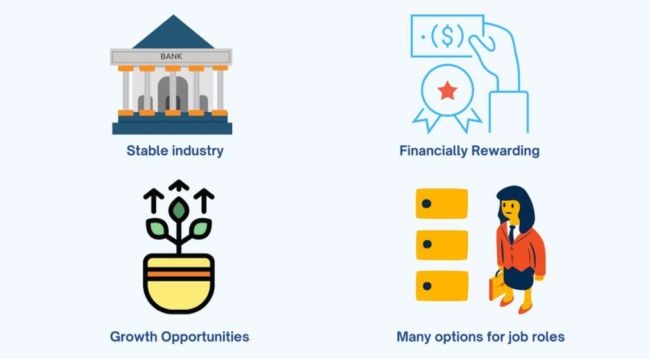You most likely have a bank account, but have you ever thought of being a banking employee? Commercial banking can be a good career path, offering opportunities for career advancement and attractive pay. But some positions in the industry (such as loan officer and credit analyst) aren’t expected to experience much growth, if any, in this decade. Is a job in commercial banks a good career path for you?
What Is Commercial Banking?
A commercial bank typically serves businesses, government agencies, and institutions like colleges and universities. Services offered by a commercial bank usually include checking accounts, loans, and lines of credit. Some of the U.S.’s highest-profile commercial banks are Bank of America, Chase Bank, KeyBank, Regions Bank, and Wells Fargo.
It’s worth noting that some definitions of commercial banking refer to banks that serve large-scale business customers as well as banks that serve small-scale customers like everyday consumers. But for the sake of this guide, we’re limiting the scope of commercial banking to business banks rather than retail banks (ones that primarily cater to individual consumers).

JPMorgan Commercial Banking
Build practical skills and experience a day-in-the-life as a commercial banker at JPM with this free Forage course.
Avg. Time: 5 hours
Skills you’ll build: Credit analysis, risk assessment, spreadsheets, cash flow statements, deal structuring
What Do Commercial Banking Jobs Pay?
As of July 2022, the typical commercial banker in the U.S. earned a median salary of $88,506 a year, according to PayScale. Another website, Comparably, puts the average annual pay of a commercial banker in the U.S. at $104,981. Comparably pegs the top salary for a commercial banker at over $541,000.
It’s worth noting, though, that some jobs in commercial banking don’t pay all that well. For example, according to the BLS, the median pay for a bank teller was $36,310 in May 2021. That’s well below the median wage of $45,760 for all U.S. occupations.
Also, some parts of the commercial banking industry are contracting. Amid the rise of financial technology and online banking, bank teller jobs are taking perhaps the biggest hit. The U.S. Bureau of Labor Statistics (BLS) forecasts a 17% decline in the number of tellers from 2020 to 2030.
Types of Careers in Commercial Banking
Careers in commercial banking cover a wide range, from branch manager to sales coach. Examples of commercial banking careers include:
- Branch manager
- Business development manager
- Commercial banking manager
- Commercial banking president
- Compliance manager
- Credit analyst
- Customer service representative
- Loan officer
- M&A analyst
- Marketing officer
- Relationship manager
- Portfolio manager
- Quality assurance specialist
- Sales coach
Entry-Level Jobs in Commercial Banking
Aspiring bankers can break into the commercial banking sector through several entry-level positions, such as:
- Administrative assistant
- Assistant manager
- Business development associate
- Loan coordinator
- Receptionist
- Teller
- Underwriting assistant
Bryan St. George, president of Keystone Bank in Austin, Texas, says being a teller can be a good springboard for entering the commercial banking business.
“You get to interact with bank customers and understand, firsthand, how a bank works. From that position, roles within the operations side of the bank are achievable,” St. George says.
Another stepping-stone job, he says, is entry-level credit analyst. From that point, you can move up to positions like portfolio manager, commercial lender, or chief risk officer. In 2021, the average salary for a credit analyst was $88,030.
Pros and Cons of Careers in Commercial Banking
Pros of Careers in Commercial Banking
St. George says witnessing the impact of your work represents one of the pros of a career in commercial banking. At a community bank, for instance, you can easily see how your actions affect the bank’s performance, he says.
“Because we get to work with so many diverse businesses and people, no two days are the same. The day-to-day does not become mundane. That’s something I’ve come to value more and more as my career progresses,” St. George says of working at a community bank.
Other potential pros of a career in commercial banking include:
- Reasonable work hours. Especially if you work at a bank branch, your work hours may be pretty attractive. That’s because many bank branches open between 8 a.m. and 9 a.m. during the workweek and close between 4 p.m. and 6 p.m. Furthermore, banks shut down on federal holidays and typically aren’t open on Sundays.
- Good benefits. Banks often provide generous benefits, such as health insurance, 401(k) plans, paid sick time, and paid vacation.
- Career advancement. Some banking employers help cover continuing education courses or even college classes.
- Entry-level opportunities. A person with a high school diploma may be able to enter the banking industry as, say, a teller and obtain valuable on-the-job training.
Cons of Careers in Commercial Banking
One of the cons of a career in commercial banking is the need to engage in challenging conversations with customers and employees from time to time, according to St. George. Complicating these conversations is the heavily regulated nature of banking.
Other potential cons of a career in commercial banking include:
- Stress. Some jobs in commercial banking might lead to a lot of stress, given the sensitivity of dealing with money and customers. Also, you might feel plenty of pressure if you’re not wild about handling financial matters or not especially comfortable with technology.
- Commission. In some cases, compensation may rely heavily on sales commissions rather than just a regular salary.
- Education. You may need a bachelor’s or master’s degree for specific careers in banking.
- Certification. To advance in commercial banking, you may need to obtain a professional certification, such as Commercial Banking & Credit Analyst (CBCA).
